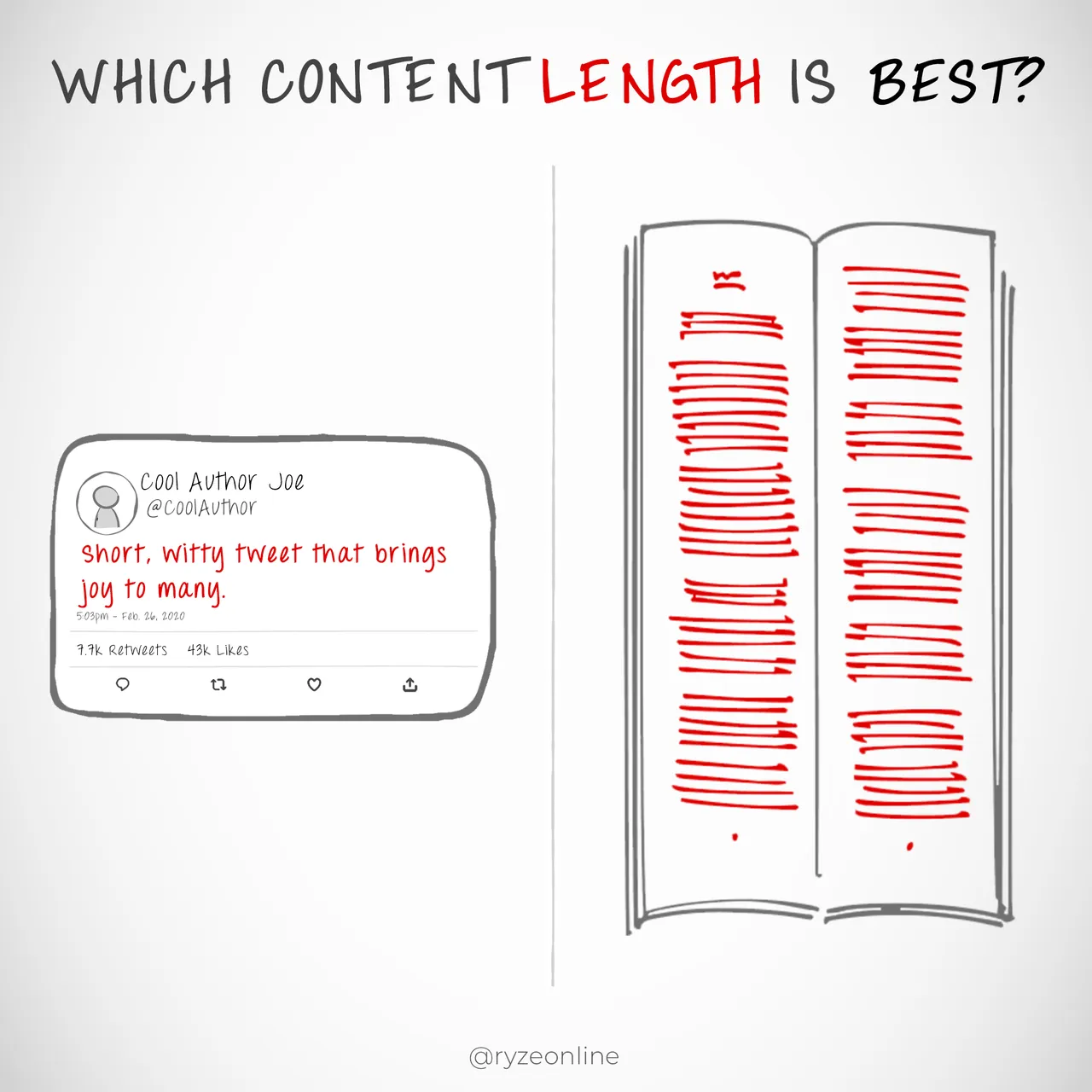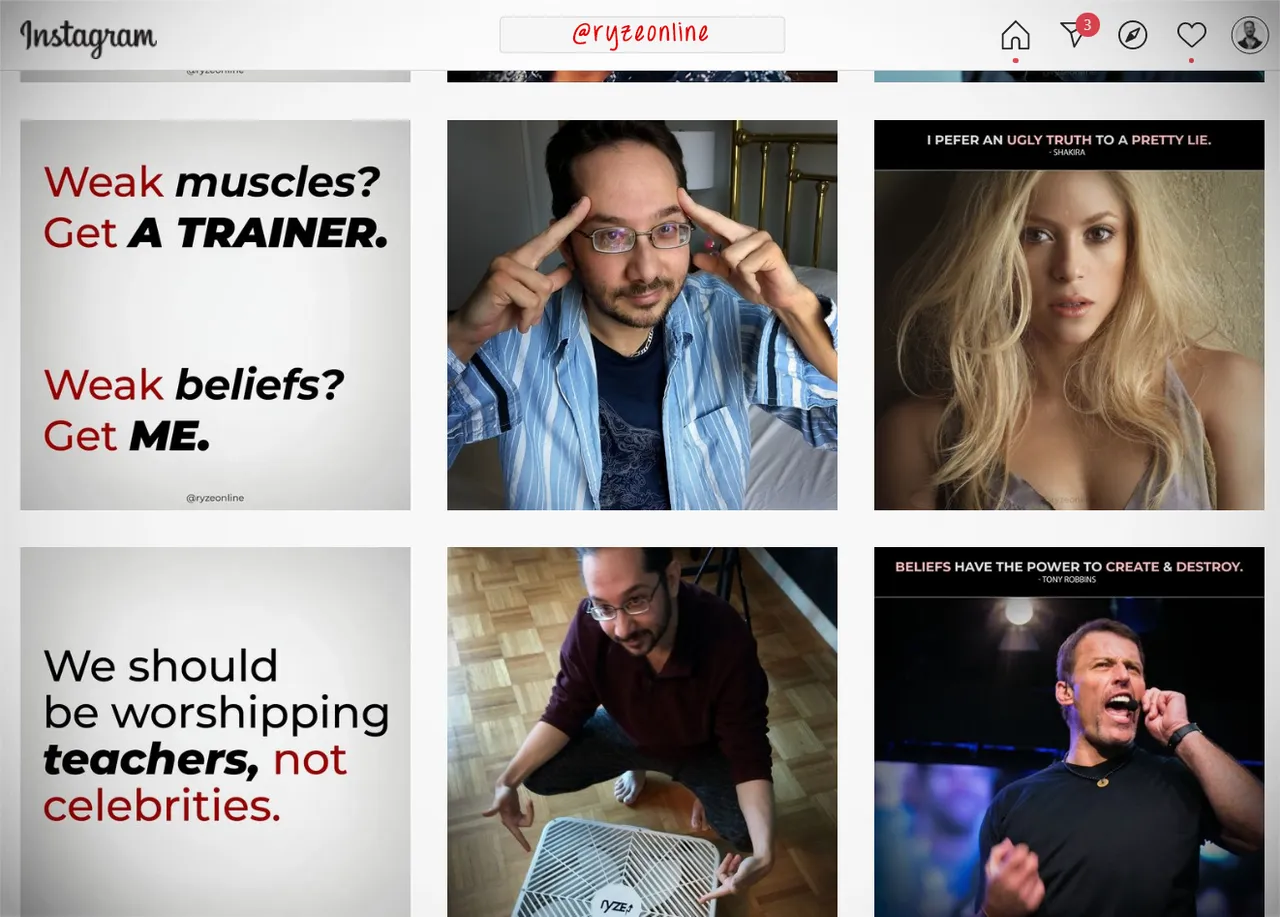My jaw was tense and I was sweating through my shirt. I wasn't in an argument. I wasn't working out. And I wasn't stuck in a desert.
I was just writing a post for you, dear reader, here on Hive.

So why does writing a post send my body into fight or flight mode? Well, it probably shouldn't technically, but I pour a lot of heart into my posts, and sometimes I let it get pretty intense. I won't explain my whole process here though, because today we're discussing only one aspect of my writing.
"Post length."
Now, I've written some of the longest content on Hive in the month-and-half since I joined. 4 of my guides exceeded Hive's max_block_size_limit of approximately 64,000 characters. (It's actually about five thousand less in my experience.) But I only write as much as I feel is necessary. Which brings us to point number one:
1. Aim for clarity, not length.
You may be surprised to know I don't actually want to write long posts. Or at least length isn't really on my mind when I start writing.
Instead, my focus is to teach clearly on a topic that matters, to people who may benefit. Whatever length I choose is based on those criteria.
Content-length is a factor of clarity & audience-knowledge.
For example, if I was teaching crypto-lovers about a generic new token, I probably wouldn't need to write very much, because they all know what a token is. They're even familiar with a variety of tokens, and it may only take a single paragraph or image to explain things clearly to them. My gaming posts were short, because all I had to do was review a game in order to make my point. Gamers have lots of background-knowledge on games, so they got what I was saying quickly. I prefer writing less. Writing isn't my favorite art form or method of expression, it's just a tool life has given me, so I use it as best as I'm able.
Part of my view on writing well is summed up by this quote:
Put it before them briefly so they will read it, clearly so they will appreciate it, picturesquely so they will remember it and, above all, accurately so they will be guided by its light. - Joseph Pulitzer
The funny thing is, I felt his quote didn't obey his own teachings enough for my liking, so I shrank it to this for my own memory:
Good writing is brief, clear, beautiful, accurate.
And despite my massive articles, this is what I aim for in my writing: brevity, clarity, beauty, and accuracy.
But since most people have given very little thought to topics like censorship or the complex nuances of Hive onboarding, when I tackle those subjects, I end up having to explain many sub-points and side-topics, just to get readers on the same page as me regarding the main point. Which brings me to our next insight:
2. Less is often more.
Or, smaller is often better. What would you rather have for your portable music device, beautiful wireless Bose earbuds or giant, wired, Walmart headphones? Would you rather spend time eating huge portions just to feel full, or be able to eat a gourmet-plated meal and feel satisfied? Which would you rather read through, a giant library or a Kindle full of ebooks?
There's no right or wrong answer to these, but many people have a strong preference for the 'smaller' version of things. And the smaller version often takes more skill to create. Plus, many people will pay a premium to get the small version. If a creator can deliver a similarly effective result in less time or space, they're highly sought after.
This is why it's a bit strange to me that some Hivers frown on something just because it's short, or praise something just because it's long. In the 'real market' there's an understanding that more results/impact in less space is valuable.
I believe that my guides deliver more wisdom in less space. My guides on Hive, Censorship, Intelligence, & Writing are each under 50 pages. Most 'expert books' on the same topics are 300+ pages. But anyone who reads my guides will learn faster than expert's books on the same topics.
Some hivers see my guides as long, but they could invest $20 in giant, convoluted books, then end up getting less value out of it.
The idea isn't to track your post-length, it's to write clearly and concisely, delivering as much value as possible, and only stopping when the 'job is complete'. When all is said and done, hopefully you've delivered the most value in the least space, 'beating' other writers, kind of like sleek Bose earbuds beat big Walmart headphones.
Interestingly, I’ve written almost a thousand posts on my Instagram...

...Where captions are limited to 2200 characters, so I have a lot of practice making my ideas concise and fitting them into a small space.
I say this because whether you choose to write short captions or long mega-guides, what really matters is that you...
3. Do whatever makes you happy.
I know some extremely successful models who spend insane amounts of time and energy on getting just the right photo. Hours in makeup. Hours spent selecting outfits. Hours in the baking sun or with sand in their shorts, or hours underdressed in the snow. Hours posing and moving and finding better lighting. Hours editing the image in post. They put so much effort into a single image for Instagram, about 1000 pixels by 1000 pixels. Then they write a one-sentence caption, and that's fine. They succeed at their own game, in their own way. I likely couldn't convince them to write long captions if I wanted to, nor would I bother trying. They provide value to their audience in their own way. I also know models who half-ass their selfies and write longer captions, and that can work too.
Or take a look at blogging. Seth Godin is a smart, accomplished man who's written many books of long-form content. But he's also famous for his short, daily blog posts on random topics. His short posts are widely shared and adored. They’re successful by most measures.
One of Seth’s posts (“But what will I tell the others?”) clocks in at just 57 words. But it got hundreds of likes, shares, retweets, etc. This is partly because he's built up brand authority, but it's also because he packs a lot of value into every sentence, and has since he began. He writes artfully and well, and people resonate with that.
Or let’s review cinema. Peter Jackson, unlike many filmmakers, creates 4-hour long movies for the Lord Of The Rings trilogy. Some YouTubers have long-form content too, while others create YouTube #shorts.
The point I’m getting at is this: you don't have to create content of any particular length. You can win with all content-lengths, as long as your content is backed by kind, loving, excellent intentions, using whatever length is truly necessary to create value for your audience.
And what is value? Well, I could write a whole book on it, but there’s no point.
Because value is an individual thing that every creator arrives at through practice, experimentation, and lots of audience feedback (including rejection.)
I hope these three insights on content-length are helpful to you, but part of giving value is ‘overdelivering’ on the promise in your headline. So here’s a 4th ‘bonus’ insight.
BONUS: Content requires context.
Some types of content perform better on certain platforms, or with certain audiences.
Twitter is founded on short content, so I probably wouldn't try posting my guides as a 'twitlonger' there and expect great results.
Blogs & media sites were founded on longer-form content, so I wouldn't make a habit of posting one-liners there.
Still, even these are just guidelines. You've still got to follow your gut and do what feels best. Who knows, maybe you'll be a disruptor and make something new work.
All this said, the main takeaway here is that we’re all guessing on content-length & value. Who knew ‘pet rocks’ were going to be seen as ‘valuable’ in the ‘70s? Who knew that watching people live their lives on ‘reality TV’ would take-off? Who knows whether their one-liner is going to be a viral hit or a dud? No one truly has a formula for this, not even Buzzfeed, the New York Times, or whatever other media you care to name.
You don't have to write book-length guides like me. You don't have to write 57-word blogs like Seth. Just do you, but inform yourself. Think things through. Apply wisdom. Experiment. Calmly absorb feedback. And most importantly, practice, practice, practice.
I’m doing it right now with this ~1,400 word post, and for a nice change... I'm not overheated and tense while writing it.
So, what content experiments are you going to try next?
P.S. This post was inspired by @ybanezkim26 (thanks!)
